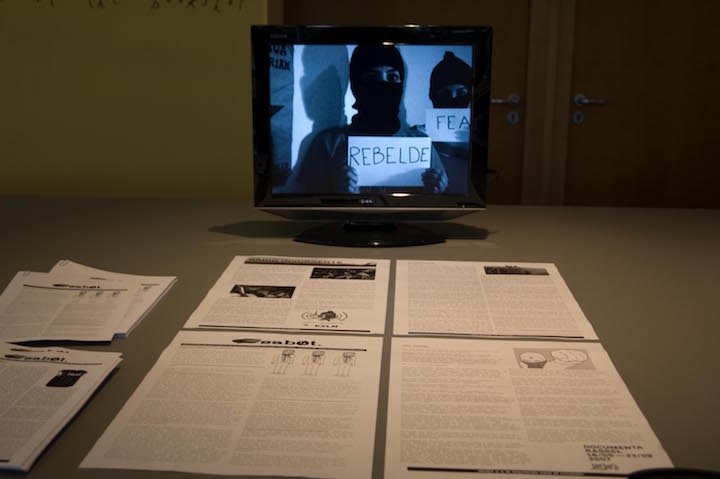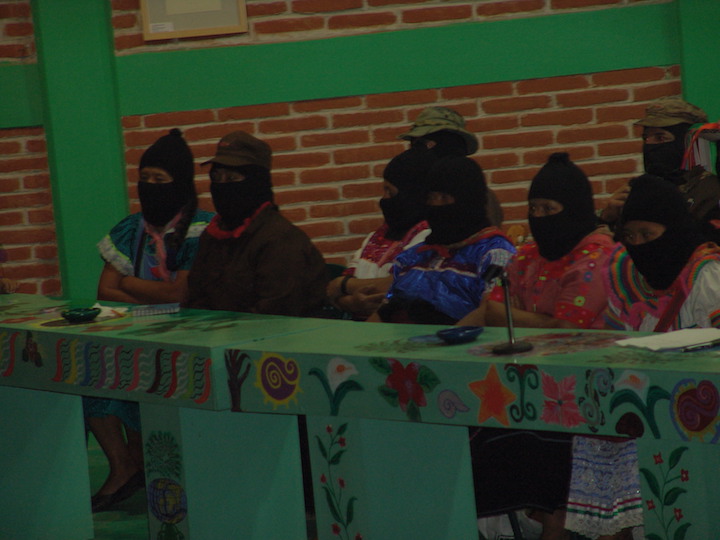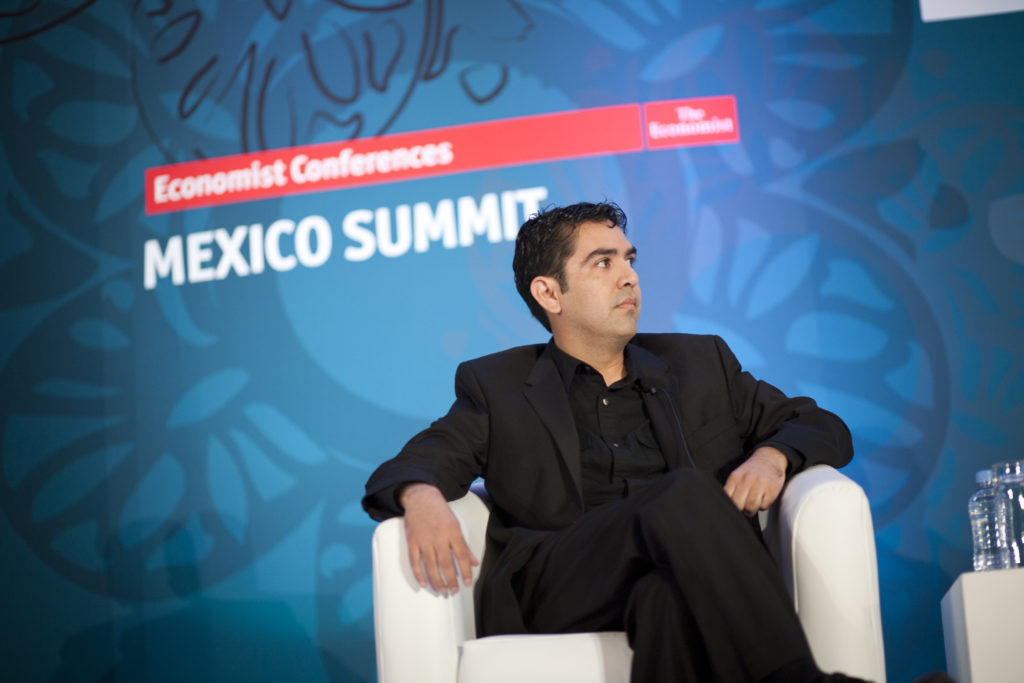Fran Ilich believes another world is possible
Fran Ilich grew up in Tijuana next to the San Diego border. As a “border kid” in Mexico, Ilich has spent his life existing in a space somewhere in between – not quite Latin enough for Mexico, certainly not American enough for the United States. Just over the border were the promises of the American Dream; but his reality was that of Tijuana in the 1990s, a time of cultural evolution…and revolution.
At his core, Ilich is a writer. As an artist, he started out writing novels and making films, then got into the rave culture of the ’90s – in Tijuana, as was the case in American cities from Detroit to L.A., “rave culture” began as a cultural movement driven by techno, with less of the connotations it has today (though certainly not absent them).

In 1994, he got involved with the Zapatista movement, a revolutionary leftist political group based out of Chiapas, the southernmost state of Mexico, with libertarian Marxism as its ideological calling card. The group’s goal was to instigate a revolution throughout Mexico that called for trade reform (the group went public on January 1, 1994, the day NAFTA went into effect), land use reform, and greater democratization of government. Ultimately, they wanted autonomy, and control over their own natural resources.
Following the same doctrine as the Zapatistas, Ilich came to believe “another world is possible” – the phrase itself a call to action among anarchists and anti-capitalists, including the Zapatistas.
Ilich did what he could on his own to support the revolutionary movement: he launched Possibleworlds, a cooperative web server, in 2005. Around the same time he also formed Spacebank, a virtual community investment bank that urges, “Don’t hate the banks. Become the banks.”
Though he doesn’t have any formal training as an economist, Ilich exemplifies the kind of ground-level creation of microeconomies by small numbers of individuals that some economists love to point to and say, “This is why the system isn’t irreparably broken.” He reads the Financial Times daily, he says, and has an instinctive ability to create economic opportunities for individuals in underserved urban environments in keeping with the Zapatista ethos.

“In Mexico, in elementary school, they teach us how to run cooperatives,” he explains. When forming Spacebank, they figured, “Why not?”
“At the beginning Spacebank was just like a box where we were writing debits and credits. Over time we had an excess of money; we had to use it or just leave it there. We decided to use it and started to make a profit; then we made more profits and had to diversity.”
In other words, the independently-run cooperative Spacebank functioned just like a real bank, despite not being “formally structured.” With the money they were reinvesting, Ilich and his partners sold T-shirts, bought commodities like honey and coffee, then decided to dive into the Mexican stock exchange during the financial crisis to buy shares at discount prices and make money back over time. Eventually Spacebank started opening accounts for people, and overnight would convert the money into shares so they could then withdraw the money and earn a small amount of interest.
Ilich’s personal microeconomy continued to expand. As a writer and filmmaker himself, he decided to form media collectives, and each collective worked around a specific website or media project that would get paid based on how Google ranked the website.

“Each time someone wrote a page they would own a share of this media project that they could then exchange for dollars and pesos that they could use to buy sugar, Cuban rum, coffee,” Ilich says. “We were basically working with production units designing little tiny economies. Some would put money in; some would put a little bit of labor; some did both. Eventually we started growing to the point that we could buy some land.”
That land was actually a co-op apartment building in the Bronx, where Ilich lives now. It was paid for in cash, and enables him to continue living in New York doing the kind of work he does, which can be difficult to fund, as well as provide a place for working artists to stay and bring in income through sharing economy outlets like Airbnb.
Ilich says Spacebank led him to think about a different kind of money system – that another world is possible.
“Things that would normally be expensive could be profitable if we had our own bank,” he says he realized. “With this bank we have been able to sustain everything.”

Spacebank also enabled Ilich to launch the Diego de la Vega Coffee Co-op, which aims to connect rural agricultural workers in Mexico’s Zapatista communities and service industry laborers in New York City by serving Zapatista-grown coffee at catered events throughout the city, for which he also won an A Blade of Grass Fellowship for socially-engaged art.
Through the coffee co-op, they serve coffee at events and people can trade coffee for money, labor, or alternative currency. They also offer a coffee CSA program. The coffee itself is planted by workers in Chiapas in a clandestine way – it is illegal to import it from Chiapas, so Ilich and his team have to rely on a network of people and a very expensive, time-consuming process just to get it across the border. “It has become a coffee that cannot be sold, just produced by these people [with whom we] are in solidarity. We support them by raising some money for them and connect to their struggles, their social realities, their social movements in a way that makes financial sense.”
As a writer, Ilich likes to play with form and structure.
“Almost every project I do is the exploration of a form, even in narrative,” he says. “Like a telenovella that explores aspects of the serialization of time or the genre.”

His writing is experimental and he doesn’t shy away from popular forms like the telenovella, precisely because that medium is so popular with so many people. He has written and filmed political and socially critical telenovellas, including one about indigenous people being evicted from land they have held for hundreds of years in order to build an airport in Mexico City, and another that was filmed in a public square for which they received legal threats from Televisa, a Mexican mass multimedia company, because the Mexican government had privatized the public square, trading over citizens’ cultural lives to Televisa, which now owned the “rights” to it.
Ilich writes novels and essays about economies and colonial histories, including the book-length essay Otra Narrativa es Posible: “Another World is Possible.”
He is currently experimenting with an alternative reality game called Sabotage Tlacatlaolli Variable, which plays on the same themes of revolution and cooperative action. The game currently has over 200 players in seven major cities across the world, from Mexico City to Madrid. Players can choose to invest or provide labor to support the game, or simply choose just to play.
Everything Ilich does is about finding alternatives to the status quo, playing with and manipulating sacred structures for the benefit of all rather than the few. As a border kid he doesn’t see just one side or the other, but rather between them. And in that liminal space between two worlds, he sees another one is possible.

(1) How do you like to collaborate?
Collaborations are different at all levels because every person is an individual. What I do know about me is that I’m very passionate and I like to get deeply lost in these intense relations. I fall in love, so to speak. But then throughout the years I started to see the frequency in which I was heartbroken because of unspoken expectations, or because sometimes people say they want to make a revolution but in practice really they meant a garage concert, or a party, or a petition, or to have an exhibition somewhere. So I had to come up with metrics and methodologies on how to immerse in relationships. In Sabotage Tlacatlaolli Variable gamers can join the support network through action, labor or capital. They are all collaborations. And they all start from the point where we coincide in space-time.
(2) How do you a start a project?
Like a turtle or a fox: at first slowly, and then all of a sudden. I do all sort of graphs and maps, dramatic structures and databases. The project has to prove to be either essential for the five year plan or a total whim. Either way, it’ll stay or it’ll go when it has to. I also like to pay attention to signals, and really focus on new projects that grow up organically. Also, the projects have to find a way to become rooted and be sustainable, emotionally and economically. I keep all sorts of spreadsheets to check that they don’t go bankrupt, again, emotionally or economically. I am always happy to send a project that doesn’t work to the delete bin.
(3) How do you talk about your value?
I like to have my work speak for itself; it tends to be very performatic in a non-theatrical way. Some people don’t know what to make of it and sometimes they prefer to think that it’s a parody. But it isn’t. I believe in the power of daily life, practice, silence, and repetition. But then again I’m a writer, so my practice has a lot do with narrative – telling stories, designing habits and experiences. I believe we have the power to build little utopias that connect to the bigger schemes that change the world. I think we have to work a lot with our capacity to imagine, retell. I experiment with alternative values in banking, economies and finance, but also in storytelling. I am particularly interested in narrative forms and structures.
(4) How do you feel success?
For me it’s all about finding those two or three people with whom a conversation can happen. To have an interlocutor is the most valuable thing you can have. Sometimes people from small and big cities, rural places or the other side of the world tell you how much something you did has helped them with their life, their work. And that’s when I noticed a particular piece was alive and speaking in ways that me myself in flesh and blood could never do, and that it sparked many things that were beyond me. Another measure is when I see something I do can spark action or conversation among other people, or ways they envision something.
(5) How do you fund your work?
By any means necessary. Most of the time I take for granted that as my work experiments so much with form, it won’t be easily find a place within the art world. But still I get a grant from time to time, although I try not to depend on them too much. Of course when I get lucky to have access to a grant I use it to its full extent. Also over the years I’ve been blessed by the universe by having been able to find support from a community of people that support my work by buying books or game subscriptions, by hosting their websites in a server I started over a decade ago, or by commissioning new work or lectures. I’ve had to become very business savvy. Also, I learned that by investing in the work of like-minded production units (for example, Zapatista communities that harvest autonomous coffee) I can contribute more to the secret agenda of “another world is possible.”
